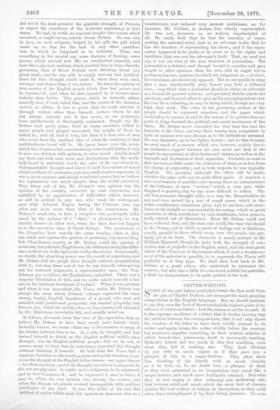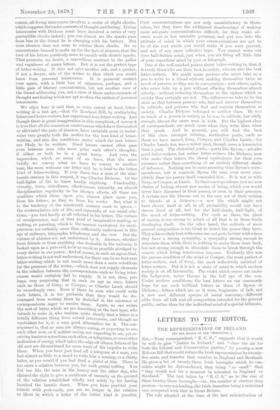LETTER-WRITING.
SOME of the new letters published within the last week from the pen of Charles Dickens, are amongst the most amusing compositions in the English language. But we should hesitate to say that even the best of those touched the highest point of ex- cellence of letters as letters. And the reason is not far to seek. It is the supreme excellence of a letter that it vivifies in every way the relation between the correspondents, that it not only shows the receiver of the letter to have been vividly present to its writer, and again brings the writer vividly before the receiver, but moreover, supplies something in their mutual relation in which face-to-face intercourse itself is necessarily wanting. Dickens's letters fail too much in this last condition, even
when they fail in nothing else. They flash Dickens on you with as much vigour as if they gave you a glimpse of him in a magic-lantern. They often show him thinking of his friends with as much vivacity as if he had,—as he no doubt had,—a glimpse of them as they were presented in an imagination very much like a magic-lantern, and much more brilliantly coloured. But what they do not supply is that softening and mellowing rela- tion between mind and mind, which the more fact of absence enables the best writers of letters to strengthen, as they could, never have strengthened it by their living presence. To some extent, all living intercourse involves a series of slight shocks, which suppress the under-currents of thought and feeling. Living intercourse with Dickens must have involved a series of very perceptible shocks indeed; you can almost see the sparks pass from him to the friend he is charging with his battery. But even absence does not seem to subdue those shocks. He so concentrates himself to make up for the fact of absence, that the best of his letters positively seem to crackle with electric sparks. That presents, no doubt, a marvellous contrast to the pallor and vapidness of many letters. But it is not the perfect type of letter-ivriting. It does not give another side, and a quieter, if not a deeper, side of the writer to that which you would learn from personal intercourse. It is personal contact over again, with a little loss of exigeance, perhaps, and a little gain of literary concentration, but not another view of the friend addressing you, not a view of those under-currents of thought and feeling which arc apt to shun the surface of personal intercourse.
We often hear it said that, to some extent at least, letter- writing is a lost arts—that Sir Rowland Hill, by multiplying letters and letter-writers, has suppressed true letter-writing. And though there is great exaggeration in this complaint, of course it is true that all the numerous contrivances which have diminished or alleviated the pain of absence, have certainly gone to under- mine very greatly both the motive for the best kind of letter- writing, and also the conditions under which the best letters are likely to be written. Good letters cannot often pass even between men who most Prize each other's thoughts, if either or both be in a great hurry. And even the impression, which so many of us have, that the more briefly we convey what we have to convey to another man, the more welcome our letter will be, is fatal to the better kind of letter-writing. If ever there was a man of the nine- teenth century in this respect, it was Charles Dickens. Of the half-lights of We he 'knew hardly anything. Punctuality, vivacity, force, orderliness, effectiveness, intensity, an almost disciplinarian regularity in his literary efforts, all these are qualities which shine upon you, almost glare upon you, from his letters, as they do from his works. But what it is the tendency of the nineteenth century most to ignore,— the contemplative side of life, and especially of our social relit- tions,—you find hardly at all reflected in his letters. The virtues of omnipresence, and of that kind of imaginative reading, or writing, or painting, which is the nearest equivalent for omni- presence, are certainly more than sufficiently understood in this age of railways, telegraphs, telephones, and the rest. But the virtues of absence are not understood by it. Absence, whether from friends or from anything else desirable in the universe, is looked -upon as a pure evil, to be as much as possible abridged by every device in our power. And of course, in such an age as that, letter-writing is not well understood, for there can be no first-rate letter-writing which is not much more than a mere substitute for the presence of the writer,—which does not supply elements in the relation between tho correspondents such as living inter- course would certainly fail to supply. It is not, then, per- haps, very surprising that in such an age as ours, letters such as those of Gray, or Cowper, or Charles Lamb should be exceedingly rare. Even if there be men who could write such letters, it is too probable that they would be dis- couraged from writing them by disbelief in the existence of correspondents eager to receive them, Again, no one writes the sort of letter which we are describing as the best type, who intends to write it, who realises quite clearly that a letter is a totally different thing from actual intercourse, and though no equivalent for it, is a very good alternative for it. The con- sequence is, that as men are always seeing, or expecting to see, each other now, or if neither seeing nor expecting to see, yet re- ceiving business notes from each other, or telegrams, or some other indication of energy which takes the edge off silence, letters of the old sort are discontinued for mere want of the impulse to write them. When you have just fired off a telegram at a man, you feel almost as little in a mood to write him a musing, or a chatty letter, as you would if you had fired a pistol at him. There is ten stern a relation between you, for such genial trilling. You feel too like the man in the lunacy suit the other day, who claimed the right to give a certificate of insanity on the ground of the relation established wholly and solely by his having knocked the lunatic down, When you have prodded your friends with post-cards, you are no longer in the relation to them in which a letter of the better kind is possible. Curt communications are not only unsatisfactory in them- selves, but they have the additional disadvantage of making more adequate communications difficult, for they make ab- sence more or less resemble presence, and put you into the attitude of mind in which your communications are apt to be of the sort which you would make if you were present, and. not of any more reflective type. You cannot write out your half-hidden mind, just when you are firing off little bits of your superficial mind by post or telegraph.
• One of the well-marked points about letter-writing is, that it is rarely those who are their best in society, who are also the best letter-writers. We could name persons who never take up a pen to write to a friend without making themselves twice. as much of persons as they are in conversatIon ; and others, again, who never take up a pen without effacing themselves almost utterly,—without reducing themselves to the ciphers which in society they certainly are not. The difference we take to be the same as that between persons who find and recover themselves in solitude, and persons who find and recover themselves in society. Charles Dickens belonged to neither class. He was as much of a person in society as he was in solitude, but oddly enough, almost the same man in both. But the highest class of correspondents are much more when they write than when they speak. And in general, you will find the best of this class amongst retiring, meditative poets, such as those we have named, Gray, Cowper, and Charles Lamb,—for Charles Lamb, too, was a minor poet, though more a hmnourist than a poet. The rhetorical poets,—poets like Byron,—are also good letter-writers, but rather letter-writers like Dickens, mon who make their letters the literal equivalents for their own presence rather than something of an entirely different shade of influence. Nothing can be more amusing than Byron's COMO- Kpondence, but it conceals Byron the man even more com- pletely than his poetry itself concealed him. It is not so with Gray, Or Cowper, or Lamb. In their correspondence you see new shades of feeling, almost new modes of being, which you would never have discerned in their poems, or even in their presence. A certain new life blooms out in the very act of their writing to friends at a distance,—a new life which might not have shown itself at all, in all probability would not have shown itself at all, but for the half-shade, half-light, of the mood of letter-writing. For such as these, the glare of society is too strong to admit of all that is in them freely developing itself. On the other hand, the solitude of mere general composition is too bleak to foster the power they have. They achieve their best with some one not quite in view with whom they have a strong sympathy, a sympathy strong enough to stimulate them while there is nothing to make them draw back, but not strong enough to stimulate them to break through the reserve which living intercourse imposes. Evidently this was the precise condition of the mind of Cowper, the most perfect of letter-writers, and of Gray, the most reflectively satirical of letter-writers. But it is not a state of mind to which modern society is at all favourable. The violet which comes out under the hedge-row, never blooms in tho full eye of the sun. Under modern conditions, the best letters we can commonly hope for are such brilliant letters as those of Byron or Dickens,—letters which are, as it were, fragments of talk, no a new and different species of social converse,—different alike from all talk and all composition intended for the general public, rather than for the individual mind of a special intimate.



































 Previous page
Previous page